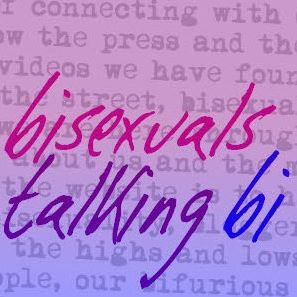Posted inEvents identity Invisibility mental health research work
Bisexuality and depression
For long as I’ve been writing this blog, one of the main ways new people find it is by searching for “bisexuality and depression”. I find that really sad, but nothing like as sad as the statistics about bisexuality and mental health.
Bisexuality and mental health is currently a big issue in the bi community. This summer’s BiReCon (the British conference that looks at current research on bisexuality) had bisexuality and mental health as its theme.
- A major Canadian study found bisexual men 6.3 times more likely, and bi women 5.9 times more likely, to report having been suicidal than heterosexual people
- A large Australian study found rates of mental health problems among bi people to be higher than those among lesbians, gay men, or heterosexuals.
- The UK Mind report on the mental health and wellbeing of LGB people found that bi men and women were less at ease about their sexuality than lesbians or gay men, and less likely to be out.
At the conference, the speakers focused on what research is currently being done by (bi) psychologists and (bi) activists and considered how mental health professionals could better serve the needs of bi people.
The Bisexuality Report, which came out earlier this year, also looked at the bad health – mental and physical – experienced by bisexual people. It collated a lot of existing research, including that listed at the top of this post.
Until now, most research on sexuality and mental health has lumped research on lesbian, gay and bisexual people into one queer mass.
What the Bisexuality Report did was to look at how bisexual people (as distinct from lesbians and gay men) experience discrimination and prejudice. It’s fair to say that this discrimination and prejudice has a strongly negative impact on everyone who don’t simply identify as straight or gay.
This includes:
Bisexual exclusion, erasure, invisibility
- Many people, even now, know of no one in their daily lives who is bisexual.
- When people at large, or organisations, say lesbian, gay and bisexual, they really mean lesbian and gay. Or sometimes just gay.
- Everyone is considered either gay or straight. Really. And if you aren’t now, you are either frightened (really gay) or experimenting (really straight).
- The concerns of bi people are ignored, trivialised, demonised, laughed at. For instance, when people say things like:
Everyone's bisexual
Men can’t be bisexual
You must be really into sex
Can I watch?
But you’re involved with X person now – that means you’re straight/gay
You’re just confused
Bi people have things really easy
And, connected with that:
Biphobia – in all its many guises
Such as:
- Rejection by the wider queer/lesbian and gay community, whether individuals or groups
- At the same time as you experience rejection from friends/ family/the wider society for not being straight. A similar sort of homophobia to that experienced by lesbians and gay men, but with added extras
- People saying things like:
- You’re too old/attractive/ugly/straight-looking/queer-looking/monogamous to be bisexual
- You’re young – you’ll grow out of it!
- Bisexuals are greedy/disgusting/can’t be trusted
I could go on… but I’m only depressing myself!
With all that, is it any surprise that so many bi people feel they don’t belong anywhere, that you will never find a lover/s who will truly accept you? That, if you are told that bi people don’t and can’t exist, and if they do there is something wrong with them, that it might lead to lack of self-belief, and ultimately self-hatred?
Difficult circumstances and depression aren’t necessarily linked, of course, but a lack of support can make a bad time so much worse.
So, lovely readers, some questions for you.
Why do you think bi people report so much depression and other forms of mental ill-health. And what do you think we – as individuals and as a community – can do to help ourselves and others?
For more things to think about, I’ve written other posts on bisexuality and mental health here
Glad to be bi
My next post (to be published on 7th September) is going to be specifically on being a happy bisexual. It would be terrible if everyone thought that bi people were only miserable when, for many of us, bisexuality is great, something that has added and continued to add to their lives. And for others, their bisexuality is something that just is. A part of them that needs no more explanation than that.
As Tom Robinson sang Glad to be Gay in the 1970s, so we need a (non-religious) Blessed to be Bi for the 2010s.
We need to spell out the reasons it’s great to be bi – even when, especially when, others think it really isn’t.
Which leads on to some more questions for you: What do you love being bisexual? And, if you didn’t always feel that way, how have you made things better? Let me know.



